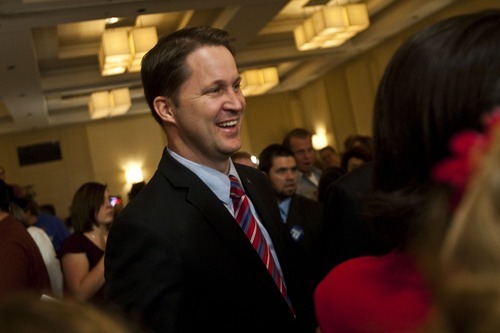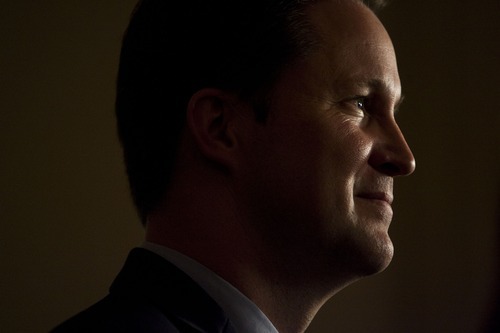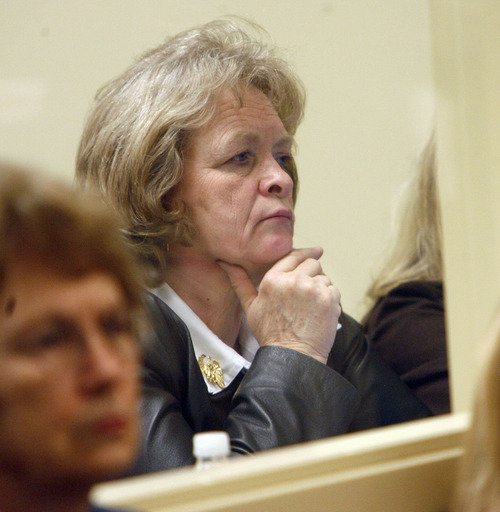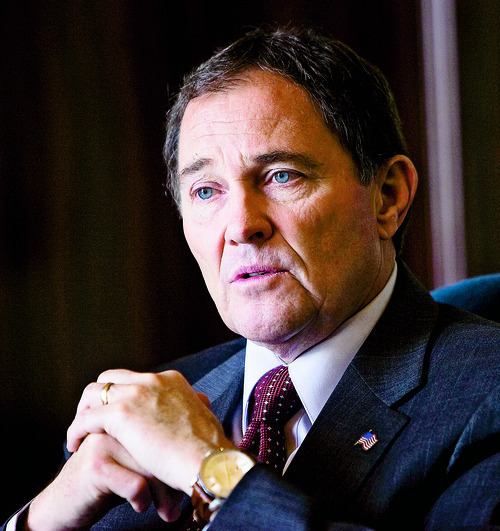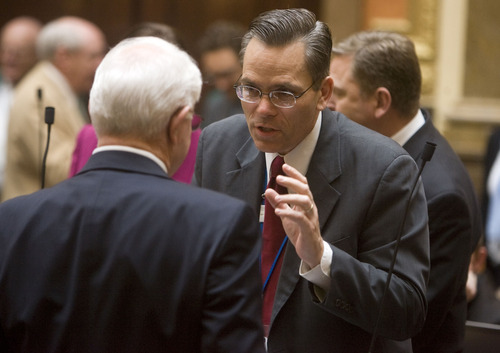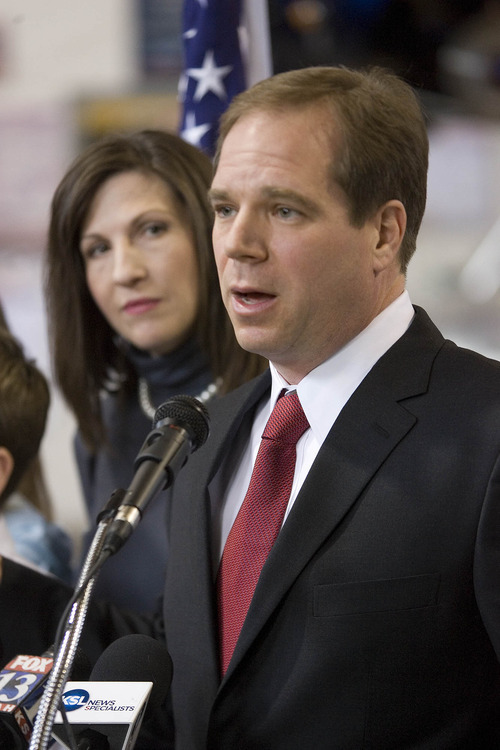This is an archived article that was published on sltrib.com in 2012, and information in the article may be outdated. It is provided only for personal research purposes and may not be reprinted.
Utah Gov. Gary Herbert's Republican opponents for governor disagree on whether he should have vetoed a sex education bill Friday.
But they are unified in their belief that the governor played politics with the timing of the veto, waiting until after the GOP caucuses — where delegates were chosen to help nominate the party's nominee — to reject the measure.
"The governor takes a poll, he doesn't take a stand," said David Kirkham, one of the contenders for the Republican nomination.
"It's clearly political," said GOP challenger Morgan Philpot. "We just don't need a governor who puts his finger in the wind and waits for the polls to tell him what to do."
Ally Isom, the governor's spokeswoman, said the governor acted on the bill in regular course and the caucuses on Thursday night didn't play into the timing.
"There are some who clearly are politicizing this issue," Isom said. "The simple truth is this: The governor made his decision when he got to the point that he made a decision, and to assert it's politically motivated is completely untrue."
Herbert decided to veto HB363, which would have mandated abstinence-only education or allowed school districts to drop sex education altogether — doing away with parents' ability to OK an opt-in for students.
A biological discussion of conception would have been allowed under HB363, but any talk of contraception or alternative lifestyles would have been prohibited.
Herbert vetoed the bill, saying it restricted parental choice and that the current system is working. Groups like the Utah Eagle Forum and Sutherland Institute and conservative legislators expressed dismay at the decision.
Paul Mero, president of the Sutherland Institute, said that since the veto came after the caucuses, it minimized the fallout. "I don't think it hurts the governor much at all," Mero said Monday. "I think the ones who already don't prefer him have another reason not to prefer him, but I don't think that will be a majority [of the delegates] at all."
Mero said he expects the governor will win the nomination at the convention and be re-elected.
Quin Monson, associate director of the Center for the Studies of Elections and Democracy at Brigham Young University, said that his organization's polling showed that 58 percent of Utahns — regardless of party — supported contraceptive education. Only among self-identified "strong Republicans" did a majority oppose teaching of contraception.
"I think there are some Republicans who are going to be upset by it, but I also think he has built up enough [political] capital on other issues that it won't be a really big deal," Monson said, noting that his group's polling has found that 94 percent of strong Republicans approve of Herbert's performance.
And, Monson said, "the timing was brilliant."
"It was brilliant because it was after the caucus and it was brilliant because it was late on a Friday," Monson said. "He didn't want a bunch of people coming to the caucus meetings mad at him about sex ed."
Stephanie Roach, a mother and first-time state delegate from West Jordan, said she supports Herbert's decision to veto HB363.
"I thought the veto was a very good move," she said. "I don't believe that keeping information from people helps them make better choices or decisions. The more information that people have, the better choices they will make, and I think that applies to teenagers as well as adults."
Rep. Ken Sumsion, R-American Fork and a challenger to Herbert, voted for the bill and said he would have signed it into law if he was governor.
"This bill was a simple values bill. It was one of those social conservative values statements we make," Sumsion said. "We have certain values and, as a parent, I think I have a right not to have my children exposed to certain other lifestyles in schools."
But Sumsion said he wasn't surprised the governor rejected the bill and doesn't think the Legislature will be able to override the veto. But he said Republicans should have been able to consider the sex ed issue when they went to their caucuses.
"Certainly this decision should have been made before caucus meetings so people can vet the decision," Sumsion said. "This was the most controversial bill of the session. … Caucus members deserve to have the best information about the candidates."
Philpot said he would have signed the bill, as well, because taxpayers shouldn't have to pay for a curriculum they find objectionable.
"I don't think it's right to ask other people to pay for this," he said. "Some people find the way we do this morally reprehensible. Some people think there's a better way to do this."
If there were true school choice, he said, parents could send their kids to a school that shares their values, but that doesn't exist in the current "top-down, one-size-fits-all machine."
Kirkham said he would have vetoed the sex ed bill, because it is another example of a bill that passed late in the session and school board members he has talked to still don't know what it would mean in the classroom.
He also received a legal opinion from a prominent Salt Lake City lawyer who said the bill is likely unconstitutional because it specifically prohibits discussion of homosexuality. Kirkham said it also would have denied families options for sex education.
"I'm very hesitant to take that choice away from a family," he said. "My opinion is, good grief, why is this even on the governor's desk? This is a local issue."
Democratic candidate Peter Cooke has said previously that he would have vetoed the bill because he supports giving parents the ability to opt students into sex education.
Twitter: @RobertGehrke


